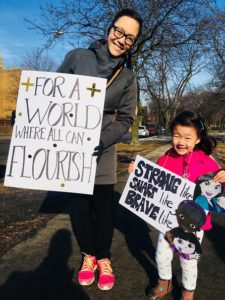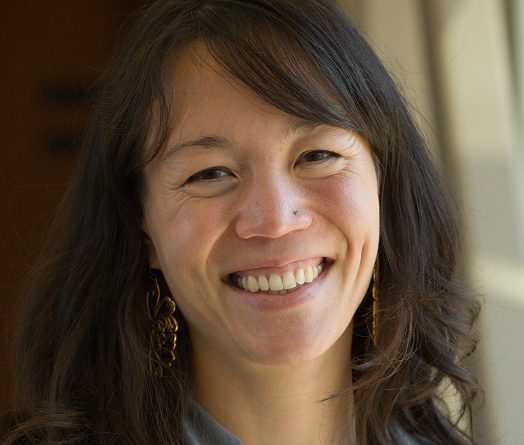Made Possible by a Legacy of Resistance by Emily McGinley
A few months ago, I attended a local gathering of clergy on the topic of faith leadership and racial healing. I had arrived a little early, so I set my things down before getting a cup of coffee. When I got back to my seat, I found myself sandwiched between a cohort of big men in big suits who were pastors of a big church, not far from where my congregation gathers on Sundays to worship. As we started to chat, as they asked me about myself and my ministry, I could see the wheels beginning to turn in their minds.
“Oh,” I said, “I’m the pastor of Urban Village Church, not far from here.” I could see their eyes narrow, “Where?” I described where we meet for worship, just a couple blocks away. I chuckled about how the start time of our service resided conveniently between two of their morning services, making for easy traffic.
“So, who comes to your church?” they ask. I explain that our commitments are to be a gospel-centered community that took Jesus’ model of inclusion seriously; especially around our commitments to anti-racism and LGBTQ inclusion.
More questions. Yes, I pastor the congregation. Yes, I planted it. Yes, we’re doing pretty well and, yes, we have been received well by the community.
Always neutral, never unkind, they asked their questions. Questions that gently probed for a hole, an indication that revealed our faulty faith; that we would be a passing fad or a feeble presence. But I stood my ground – I stood our ground – and spoke with an unapologetic honesty. “We get many people who might initially have chosen to go to another church but, because they have not been fully welcomed, or they knew their friends would not be welcomed, they have found a home in our community.”
As the event began and unfolded, I became keenly aware of two things: 1) I was one of very few women in the room and, 2) Other than a paid panelist, I was the only Asian-American in the room. I had this growing feeling – sort of like uneasiness, but I wasn’t afraid. And then, I realized: it had been quite a while since I’ve been in a space where the legitimacy of my personhood as an identified church leader was so blatantly interrogated, where I was so obviously a minority. It had been some time since the ministry I was engaged in, the congregation I planted, cultivated, and cared for, was called into question.
And, I have to say: Aren’t I lucky? I mean it. It is a privilege to have to encounter experiences like this only a few times a year, compared to some of my female colleagues completely entrenched in woman-hating church cultures. Aren’t I lucky, as a cis-gender, hetero, married, parenting, woman who doesn’t have to be told I’m using the wrong bathroom, or asked when I’m going to get married, or when I’m going to have kids; who doesn’t have to wonder if I can hold my spouse’s hand in public… Aren’t I lucky?
I would most certainly rather not be in these kinds of spaces, or ever made to feel uncomfortable in my own skin. Yet, coming just before we celebrated five years of Urban Village Church (Hyde Park | Woodlawn), it was a powerful reminder of how important it is that I exist, that my congregation exists. Existence, as the saying goes, is a kind of resistance.
There is an alphabet book I read to my daughter from time to time – A is for Activist – and I’ve always appreciated the entry for “F”:
F is for feminist,
for fairness in our pay;
for freedom to flourish
and choose our own way!
My existence is made possible by the long legacy of resistance among women who had the courage to choose their own way; who have lived out of the very basic belief that they had something to offer the world – even if it didn’t fit with what people imagined for them. I am grateful to those women who unapologetically lived their truth with great faith and courage, who showed the world that the greatest way to reflect God’s vision of wholeness of life for all didn’t demand that they diminish themselves; women who scrapped and scraped to make a way where there seemed to be no way. I am part of this legacy.
There was my grandmother, who strapped the family wealth to her body as she fled the communist takeover of China, boarding a boat to Taiwan with her five young children. My mother, who grew up in refugee housing, earned a 4 -year degree that meant nothing in the U.S., and started over in nursing school. I still remember waking up in the bedroom we shared, seeing her listen to recorded lectures as she consulted her medical dictionary on one side and her Chinese-English dictionary on the other. A legacy of courage, tenacity, of way-making.
I’m grateful, also, for the men who are part of that legacy: my grandmother’s brother who unbound her feet when she was a teenager, believing that she should be able to move on her own accord and without pain. My mother’s classmate in nursing school – and the only other person of color in the program – who studied with her and encouraged her. And the men who helped me choose my own way, sharing power and extending invitations—seeing women, if not as equals, as people whose intellect and contributions were worth respecting and taking seriously. I have had such men in my life: Bill Yoder, the missionary I came to know when I volunteered for a year in Thailand; Frank Yamada, the professor (later colleague, then boss); Christian Coon and Trey Hall, colleagues who saw in me the capacity to seed a new faith community and invested in that possibility; my husband, who continually supports me in the ministry, cooking meals for after church, carrying the bulk of childcare, looking out for articles and podcasts that might enhance my work.
I might find myself troubled, frustrated, or downright enraged by the misogyny that I hear, observe, or experience from time to time – in the church or otherwise. But, I also know that I stand on the tall shoulders of women and men who have empowered me to choose my own way. I know that I have inherited a legacy of creative tenacity that enables me to make a way. And, I know that there are young women and girls who will one day climb up onto my shoulders. I will stand as tall as I can so that, one day, they can make their way.
 Rev. Emily McGinley is the founding pastor of Urban Village Church (Hyde Park-Woodlawn), located in Chicago. With a background in the non-denominational, evangelical tradition, and ordination in the Presbyterian Church (USA), she has extensive experience working with leaders across diverse networks and Christian traditions. She has preached and presented nationally on the topics of vocational discernment, preaching for millennials, church planting, social media in ministry, inclusive evangelism, and anti-racist church leadership. In addition to coaching church planters and congregations, Rev. McGinley is a contributing writer to multiple publications. Her commitment to building gospel-shaped inclusive spaces that nurture, challenge, and practice radical hospitality have helped cultivate beloved community in a variety of settings.
Rev. Emily McGinley is the founding pastor of Urban Village Church (Hyde Park-Woodlawn), located in Chicago. With a background in the non-denominational, evangelical tradition, and ordination in the Presbyterian Church (USA), she has extensive experience working with leaders across diverse networks and Christian traditions. She has preached and presented nationally on the topics of vocational discernment, preaching for millennials, church planting, social media in ministry, inclusive evangelism, and anti-racist church leadership. In addition to coaching church planters and congregations, Rev. McGinley is a contributing writer to multiple publications. Her commitment to building gospel-shaped inclusive spaces that nurture, challenge, and practice radical hospitality have helped cultivate beloved community in a variety of settings.

